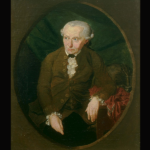Quote:
In hot countries, men mature more quickly in every respect but they do not attain the perfection of the temperate zones. Humanity achieves its greatest perfection with the white race. The yellow Indians have somewhat less talent. The Negroes are much inferior and some of the peoples of the Americas are well below them.
Source:
Immanuel Kant (1764): Physische Geographie 2. T. 1. Abs. § 3 (IX 195). Königsberg: Göbbels und Unzer. Translation by David Harvey (2000): p. 4.
Author Bio:
Immanuel Kant (1724-1804) was the most famous German philosopher of the Enlightenment. He spent most of his life in Königsberg. He was central to the shaping of racial theory in the German-speaking world.
Context:
 Although universal human rights are commonly associated with the era of the Enlightenment, this was also the period in which racial theories emerged. The idea that all people were free and equal was a threat to those who benefited from inequality. So a parallel theory was needed in order to prove why some could not, after all, be fully equal (see above, Adorno and Horkheimer’s Dialectic of Enlightenment). Immanuel Kant attempted to construct a “race hierarchy” based on “reason”, “morality”, “maturity”, “the potential for being educated” and “laziness” as characteristics of otherness. He placed the white man at the centre of this ideology and made him the norm by which progress was measured. Kant’s devaluation of people of colour went so far that he wondered why certain regions of the world existed at all.
Although universal human rights are commonly associated with the era of the Enlightenment, this was also the period in which racial theories emerged. The idea that all people were free and equal was a threat to those who benefited from inequality. So a parallel theory was needed in order to prove why some could not, after all, be fully equal (see above, Adorno and Horkheimer’s Dialectic of Enlightenment). Immanuel Kant attempted to construct a “race hierarchy” based on “reason”, “morality”, “maturity”, “the potential for being educated” and “laziness” as characteristics of otherness. He placed the white man at the centre of this ideology and made him the norm by which progress was measured. Kant’s devaluation of people of colour went so far that he wondered why certain regions of the world existed at all.Further Reading:
*Emmanuel Chukwudi Eze (ed. 2007): Race and the Enlightenment: A Reader. New Jersey: Wiley-Blackwell.
*Devin J. Vartija (2021): The Color of Equality Race and Common Humanity in Enlightenment Thought. Philadelphia: University of Pennsylvania Press.
Year:
1764